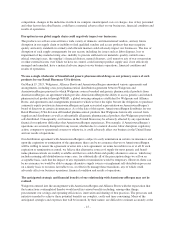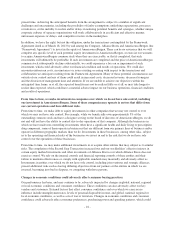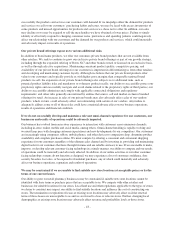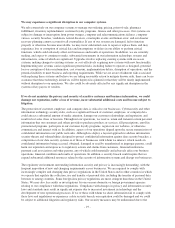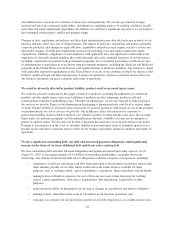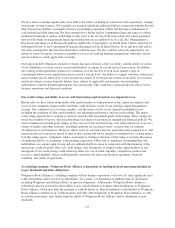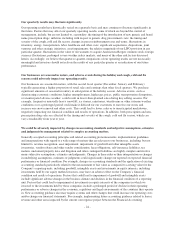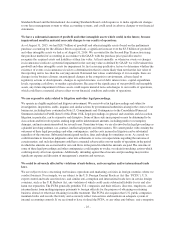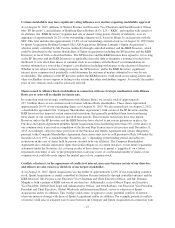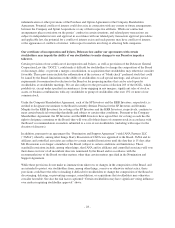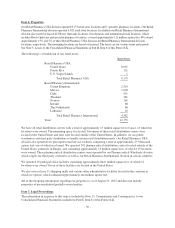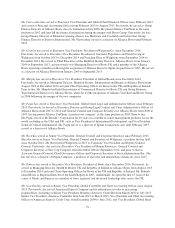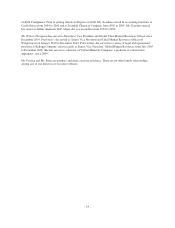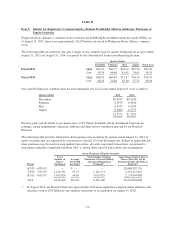Walgreens 2015 Annual Report Download - page 29
Download and view the complete annual report
Please find page 29 of the 2015 Walgreens annual report below. You can navigate through the pages in the report by either clicking on the pages listed below, or by using the keyword search tool below to find specific information within the annual report.Standards Board and the International Accounting Standards Board could require us to make significant changes
to our lease management system or other accounting systems, and could result in adverse changes to our financial
statements.
We have a substantial amount of goodwill and other intangible assets which could, in the future, become
impaired and result in material non-cash charges to our results of operations.
As of August 31, 2015, we had $28.7 billion of goodwill and other intangible assets (based on the preliminary
purchase accounting for the Alliance Boots acquisition), a significant increase over the $3.5 billion of goodwill
and other intangible assets we had as of August 31, 2014. We accounted for the Second Step Transaction using
the purchase method of accounting in accordance with GAAP, with the purchase price paid allocated to
recognize the acquired assets and liabilities at their fair value. At least annually, or whenever events or changes
in circumstances indicate a potential impairment in the carrying value as defined by GAAP, we will evaluate this
goodwill and other intangible assets for impairment by first assessing qualitative factors to determine whether the
existence of events or circumstances leads to a determination that it is more likely than not that the fair value of
the reporting unit is less than the carrying amount. Estimated fair values could change if, for example, there are
changes in the business climate, unanticipated changes in the competitive environment, adverse legal or
regulatory actions or developments, changes in capital structure, cost of debt, interest rates, capital expenditure
levels, operating cash flows, or market capitalization. Because of the significance of our goodwill and intangible
assets, any future impairment of these assets could require material non-cash charges to our results of operations,
which could have a material adverse effect on our financial condition and results of operations.
We are exposed to risks related to litigation and other legal proceedings.
We operate in a highly regulated and litigious environment. We are involved in legal proceedings and subject to
investigations, inspections, audits, inquiries and similar actions by governmental authorities arising in the course of our
businesses, including those contained in Note 13, Commitments and Contingencies to the Consolidated Financial
Statements included in Part II, Item 8 of this Form 10-K. Legal proceedings, in general, and securities and class action
litigation, in particular, can be expensive and disruptive. Some of these suits may purport or may be determined to be
class actions and/or involve parties seeking large and/or indeterminate amounts, including punitive or exemplary
damages, and may remain unresolved for several years. From time to time, we are also involved in legal proceedings as
a plaintiff involving antitrust, tax, contract, intellectual property and other matters. We cannot predict with certainty the
outcomes of these legal proceedings and other contingencies, and the costs incurred in litigation can be substantial,
regardless of the outcome. Substantial unanticipated verdicts, fines and rulings do sometimes occur. As a result, we
could from time to time incur judgments, enter into settlements or revise our expectations regarding the outcome of
certain matters, and such developments could have a material adverse effect on our results of operations in the period
in which the amounts are accrued and/or our cash flows in the period in which the amounts are paid. The outcome of
some of these legal proceedings and other contingencies could require us to take, or refrain from taking, actions which
could negatively affect our operations. Additionally, defending against these lawsuits and proceedings may involve
significant expense and diversion of management’s attention and resources.
We could be adversely affected by violations of anti-bribery, anti-corruption and/or international trade
laws.
We are subject to laws concerning our business operations and marketing activities in foreign countries where we
conduct business. For example, we are subject to the U.S. Foreign Corrupt Practices Act (the “FCPA”), U.S.
export control and trade sanction laws, and similar anti-corruption and international trade laws in certain foreign
countries, such as the U.K. Bribery Act, any violation of which could create substantial liability for us and also
harm our reputation. The FCPA generally prohibits U.S. companies and their officers, directors, employees, and
intermediaries from making improper payments to foreign officials for the purpose of obtaining or retaining
business abroad or otherwise obtaining favorable treatment. The FCPA also requires that U.S. public companies
maintain books and records that fairly and accurately reflect transactions and maintain an adequate system of
internal accounting controls. If we are found to have violated the FCPA, or any other anti-bribery, anti-corruption
-25-


